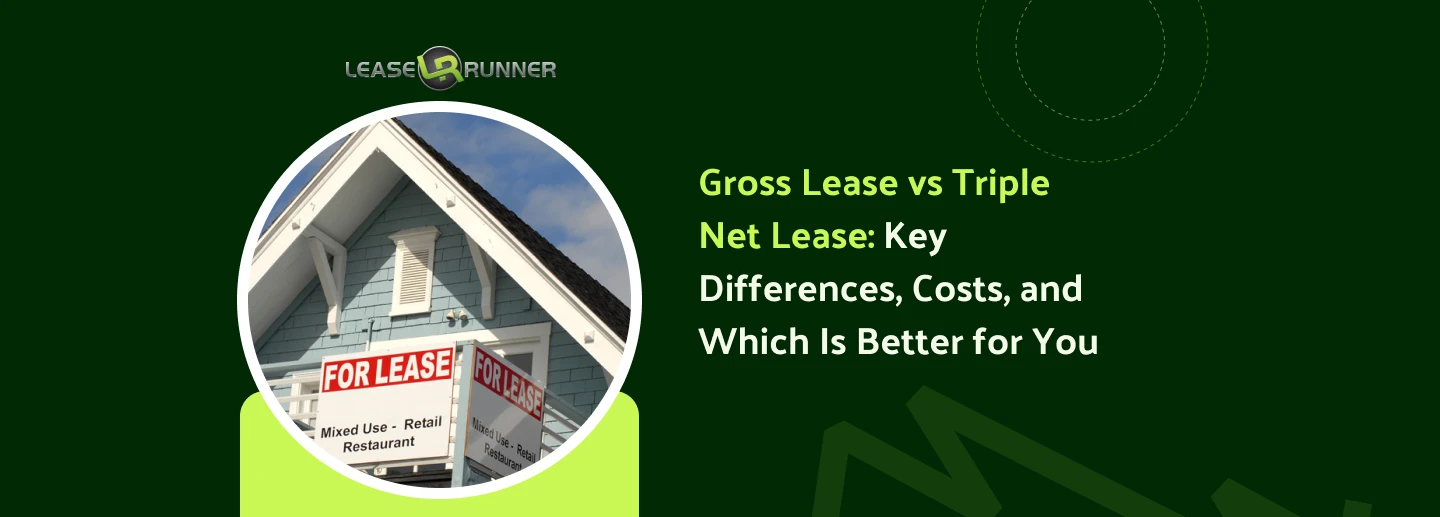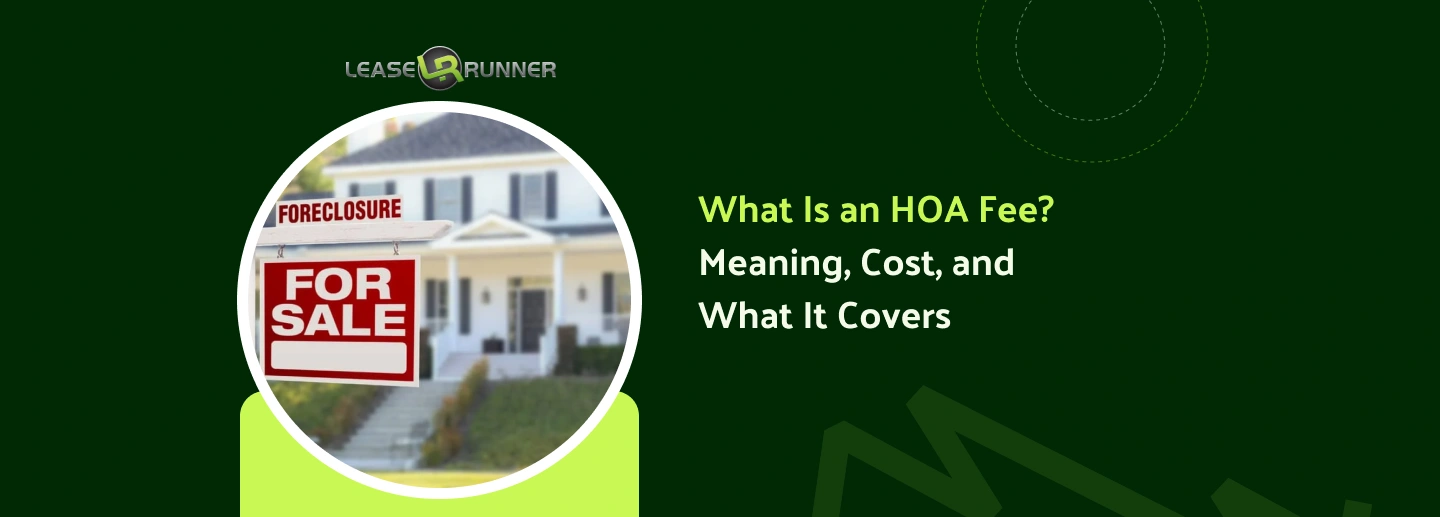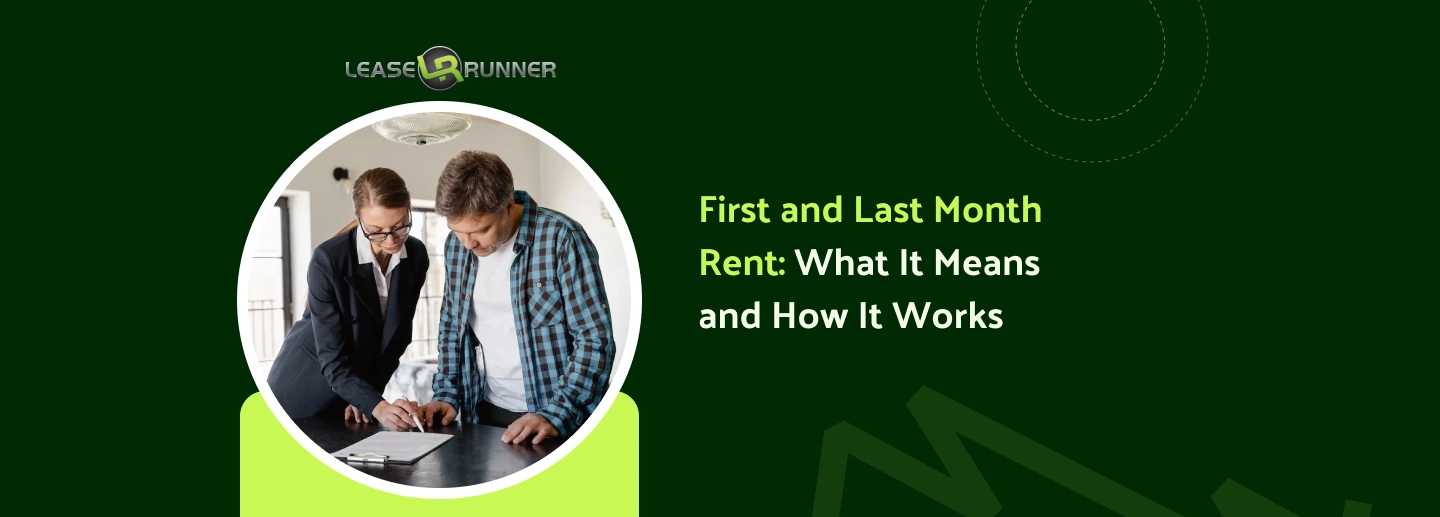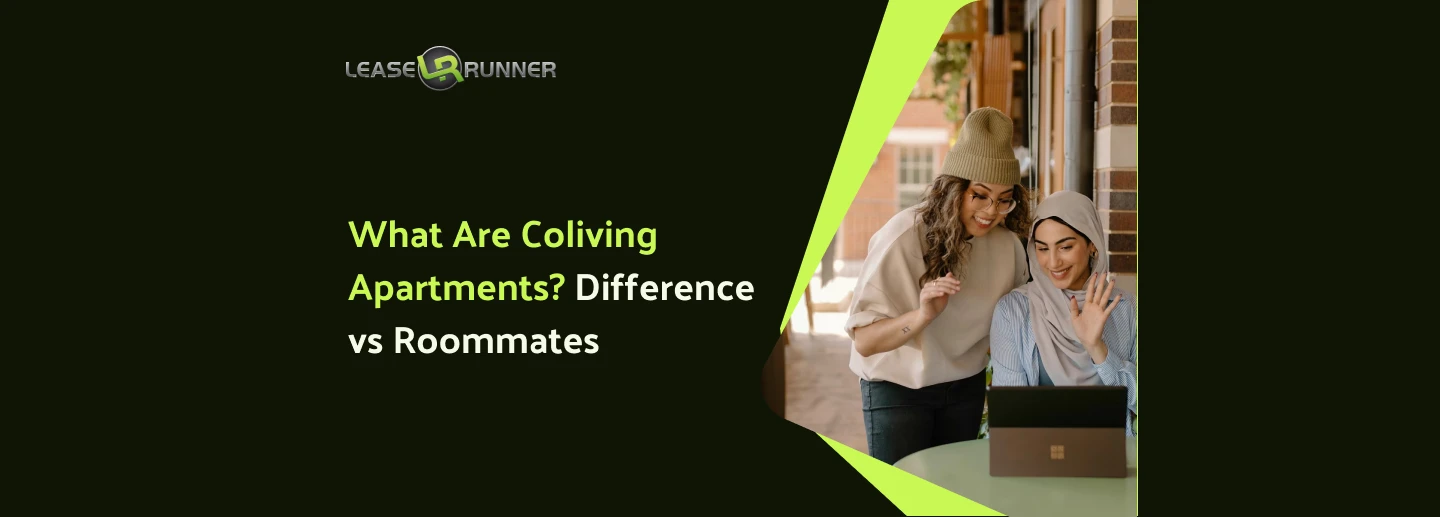The choice between a gross lease and a triple net lease shapes how landlords manage costs and risks in commercial properties. A gross lease has tenants pay a fixed rent that covers most expenses, like taxes and maintenance. For example, landlords renting office space under a gross lease handle property taxes and insurance, while tenants pay only rent.
In contrast, a triple net lease (NNN) shifts these costs to tenants. Understanding the difference between net lease and gross lease helps landlords control budgets and avoid surprises. Comparing gross lease vs NNN clarifies financial duties, letting landlords pick the best fit for steady income and property needs.
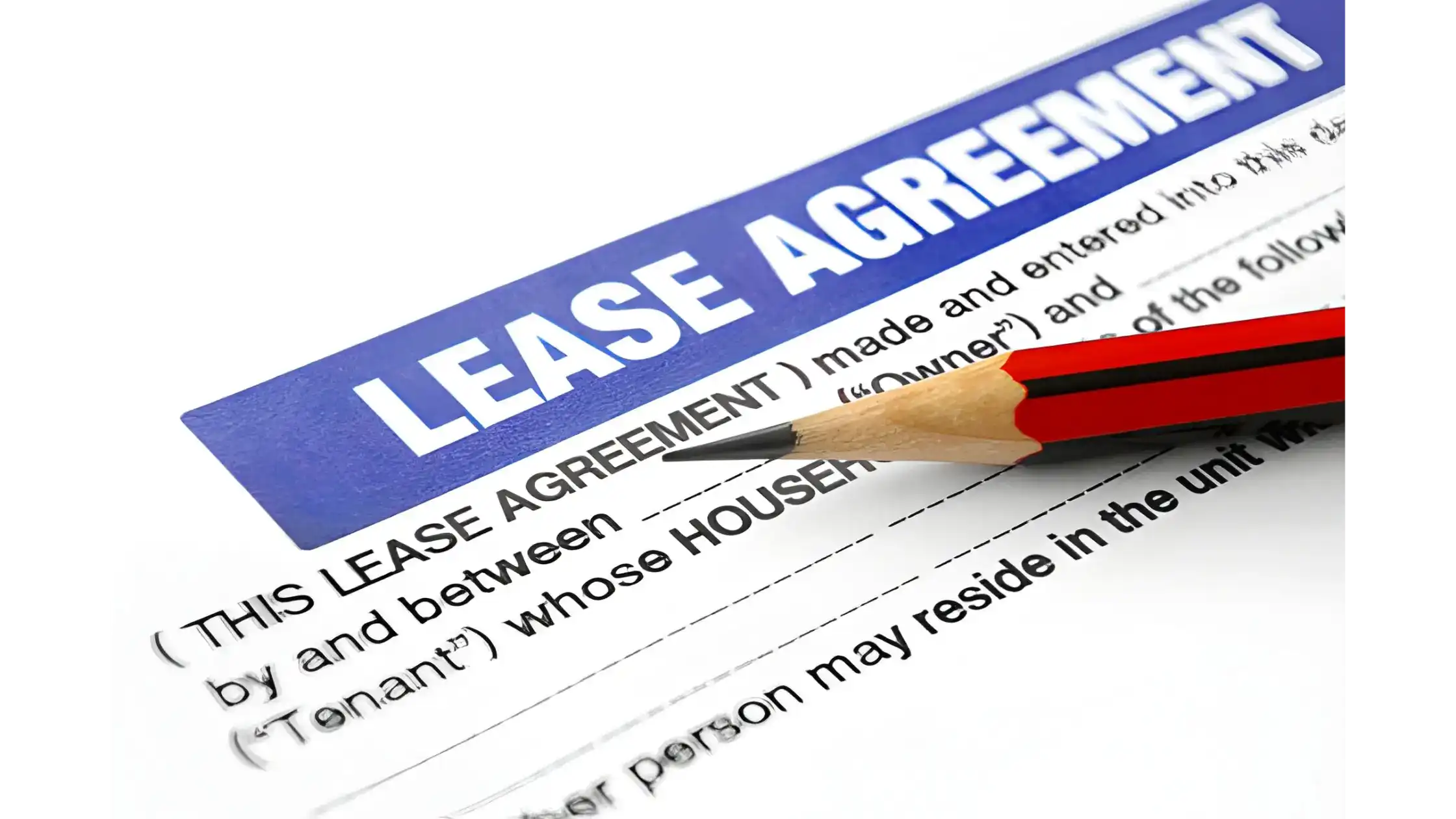
What Does Gross Lease Mean?
Understanding lease types is crucial for landlords seeking to maximize profits and effectively manage property risk. The gross lease stands out because it's simple and predictable. It’s a popular choice for many commercial and residential rentals.
Definition of Gross Lease
A gross lease bundles most property expenses (like property taxes, insurance, and maintenance) into a single, fixed rent amount. The tenant pays just one fee. Unlike a triple net lease (NNN), where tenants pay those costs separately, the gross lease shifts these obligations to the landlord.
This means landlords handle the operating expenses. They get a flat rent sum without adding extra fees to tenants.
Example:
- A landlord leases an office space with a gross lease. The tenant pays $2,000 every month.
- The landlord uses that money to pay the $500 monthly property tax and the $100 building insurance premium.
- The landlord also handles routine maintenance, like replacing broken light fixtures or fixing a minor plumbing leak.
When comparing what NNN means on a lease or examining the difference between NNN and gross leases, understanding this distinction is crucial for selecting the right fit.
Types of Gross Leases and Their Variations

The gross lease seems simple, but it has variations.
- Modified Gross Lease: This adjusts the cost of duties. Tenants might pay some utilities in rent or cleaning fees, but landlords still cover major costs.
For example, a store tenant pays for its own electricity, and a landlord handles the big bills like property tax and insurance. This hybrid plan is common in buildings with multiple tenants.
- Full Gross Lease: Landlords bear all operational and repair costs. Tenants get the ease of one payment.
Understanding the difference between net lease and gross lease shows how risk changes with each type. These rules are always written in a lease addendum to prevent arguments.
Advantages and Disadvantages of a Gross Lease
The main good thing about a gross lease is the steady rent consistency. Landlords get a fixed income. This stability is perfect for owners who want control over their money. Yet, the gross lease vs triple net lease cost comparison shows some risks. Landlords could face surprise repair or tax increases, hurting their profits.
For instance, if the local council suddenly raises property taxes by 20%, the landlord must absorb the entire cost. The tenant's rent does not change.
Reviewing gross lease vs triple net pros and cons advises landlords to weigh control versus surprise costs. The gross lease’s simplicity is great for smaller buildings, but tenants have less financial responsibility.
Here is more useful advice:
- Build a Cushion: Increase the initial rent amount by 10% to build a maintenance reserve. This protects your income when unexpected costs hit, like a surprise bill for the parking lot.
- Set Clear Limits: In the lease, limit how often tenants can ask for maintenance. For example, state that the landlord is only responsible for emergency repairs and one preventative service call per year.
- Use Escalation Clauses: Include a clause that increases the rent each year by a fixed 3% or by the Consumer Price Index (CPI). This guards your income against inflation and rising operating expenses.
The opposite of a triple net lease often means more work for the landlord, but also greater control. Landlords can learn from what are the disadvantages of a gross lease and explore the entire gross lease vs net lease vs triple net lease range.
What Is a Triple Net Lease (NNN)?

A triple net lease (NNN) is a common deal, especially for commercial properties. It changes the way landlords and tenants split property costs. If you own a large building, like an office or a store, understanding this lease helps you get a safe, easy income.
Definition of Triple Net Lease
A triple net lease (NNN) gives property owners steady income. It shifts almost all operating costs to the tenants. With this lease, the tenant pays property taxes, building insurance, and maintenance expenses on top of the base rent. Landlords often use this lease for big spaces like retail plazas, office buildings, or warehouses.
When you look at what NNN means on a lease, remember that landlords are only responsible for major issues, such as fixing the main structure or capital improvements. This means the landlord gets an easy, predictable income. If you want more details on terms, read about the difference between lease and rent for a full overview.
Characteristics of a Triple Net Lease
In an NNN lease, tenants run the building's daily operations and pay the costs. They pay for utilities, landscaping, and all upkeep.
Here are clear examples of the actions mentioned:
- Tenant pays: A retail store tenant gets the bill for the local property tax. They also pay the building insurance fee. If the landlord requires a capital improvement, like a new air conditioning unit, the tenant might handle that cost.
- Tenant manages: A restaurant tenant needs a fix for a broken window. They call the glass repair company and pay the bill. They also hire a crew to patch the parking lot in the spring. These maintenance expenses fall on the tenant, freeing the landlord from these small jobs.
The base rent calculations stay the same, which is good for the landlord.
Comparing gross vs NNN helps show the difference. A gross lease mixes all costs into one big rent payment. The NNN structure separates these costs. This makes spending clearer. A middle choice, the modified gross lease vs NNN, splits the costs between both people.
Understanding the difference between net lease and gross lease shows how to divide duties and risk. To report income easily, landlords should review net rent vs gross rent for examples.
Advantages and Disadvantages of a Triple Net Lease

The main good thing for landlords is the easy, low-maintenance income stream. An NNN structure often attracts stable tenants, like big retailers, who will take good care of the property. Landlords get a safe investment with little work. When comparing gross lease vs triple net lease cost, landlords see reduced surprise expenses.
But there are risks. Long empty periods mean no money. Some tenants might neglect building upkeep. When looking at the gross lease vs triple net pros and cons, landlords should know that property values can change and make rent harder to adjust. To know your own costs, refer to our guide on what the landlord pays in a triple net lease for more suggestions and insights.
For landlords who want more control, the gross lease vs net lease vs triple net lease comparison helps pick the right fit. The disadvantages of a gross lease can be hidden repair costs. The opposite of a triple net lease, the gross lease, keeps costs steady but limits the tenant's duty.
Here is more useful advice:
- Require Regular Reports: Make the tenant send you an annual report showing what they spent on maintenance expenses and repairs. This keeps them from neglecting the property.
- Budget for the Roof: Even in an NNN lease, put money aside for capital improvements. The roof or foundation is usually your job. Always plan for these huge, rare costs.
For those with flexible deals, read about a month-to-month lease or sublease to manage short-term tenants.
Gross Lease vs Triple Net Lease — Key Differences

Landlords often ask about the real differences between a gross lease and a triple net lease. Understanding how these leases work day-to-day helps you manage risks, income, and tenant relations.
Side-by-Side Comparison Table
Cost Comparison
When budgeting, the cost gap between a gross lease and a triple net lease is important. With a gross lease, landlords usually set higher rent to include property taxes, insurance, and repairs expected over the year. For example, a landlord might charge $40/sq ft with a step-up increase yearly to cover rising costs.
In contrast, a triple net lease (NNN) has a lower base rent (often 15–30% less), but tenants pay their share of variable expenses like tax increases or maintenance surprises. Tenants should prepare for this by budgeting quarterly, as bills can fluctuate.
This protects landlord income but adds unpredictability for tenants. Landlords with sufficient expense data often price gross leases to capture true costs and avoid losses.
Pros and Cons Comparison
Gross lease pros:
- Predictable rent and simple tenant billing help tenants budget.
- Fewer disputes since tenants pay one amount each month.
- Eases property management for tenants new to real estate.
Gross lease cons:
- Landlord profits can drop if expenses rise unexpectedly.
- The landlord handles all bills and repair coordination, increasing the workload.
- To cover risk, landlords charge higher rent, which may deter price-sensitive tenants.
Triple net lease pros:
- Gives landlords stable, near-passive income since tenants cover variable costs.
- Tenants control spending on taxes, insurance, and maintenance, improving transparency.
- Attracts tenants committed to long-term occupancy, often national or creditworthy.
Triple net lease cons:
- Tenants face uncertain expenses and must manage all property-related bills.
- If tenants fail to pay, landlords face financial and operational risk.
- Deferred maintenance by tenants can reduce property value if not monitored.
Which Lease Type Is Better for You?

Choosing between a gross lease and a triple net lease (NNN) involves more than market trends. It requires a close look at your risk tolerance, how much you want to manage day-to-day, the type of tenants you attract, and your long-term goals.
For Tenants
Many tenants pick a gross lease because it offers clear monthly costs. You pay one rent amount that usually covers property taxes, insurance, and maintenance. For example, a local café renting a space under a gross lease will spend $2,500 monthly without worrying about surprise bills like water or repair fees.
This setup frees tenants to focus on their business without handling property details. Such tenants often value this stability, even when rent is a bit higher to cover landlord risks. This difference is key when comparing gross lease vs NNN agreements.
By contrast, tenants wanting more control often choose an NNN lease. Here, you pay base rent plus your share of taxes, insurance, and upkeep. Say a national retail chain signs a triple net lease with $5,000 base rent plus $1,000 monthly for property taxes and $600 for maintenance.
They manage vendor choices and inspect expenses on site. This control helps them ensure quality and cost efficiency. Banks and big companies often prefer this model because it lets them tailor building care to brand standards.
For Landlords
A gross lease fits landlords who run multi-tenant buildings or have many shared services like elevators or landscaping. For example, a landlord with a small office park charges tenants $3/sq ft gross rent, collecting all expenses in one payment. They expect some turnover and prefer managing maintenance directly to keep quality consistent. This option suits those who can estimate costs well and tolerate variable income.
The triple net lease suits landlords who want steady, hands-off income. Imagine owning a stand-alone pharmacy leased for 10 years under an NNN lease. You collect rent without paying taxes or insurance. Tenants handle repairs and upkeep.
This hands-off style reduces your workload and attracts investors who value predictable returns. Many landlords choose NNN leases when targeting long-term, creditworthy tenants or planning to sell to investors who prize low administrative risk.
Conclusion
At LeaseRunner, we understand the importance of choosing between a gross lease and a triple net lease. This decision shapes your income and management for many years. With a gross lease, the landlord handles costs like property taxes, insurance, and maintenance. That means tenants pay a fixed rent without surprise bills. This works best in multi-tenant properties where expense control is harder.
In contrast, a triple net lease (NNN) shifts these costs to tenants. Landlords gain a steady income and less management work. Tenants, yet, pay variable expenses and must handle upkeep. The choice depends on your property type, tenant needs, and risk tolerance. Use LeaseRunner’s tools to pick the lease model that best suits your goals.
FAQs
Is a Gross Lease Good for Tenants?
Yes, a gross lease can be good for tenants who want predictable and simple costs. Under a gross lease, tenants pay a fixed rent that covers rent, property taxes, insurance, and maintenance. For example, a small business renting an office for $3,000 per month won’t deal with water bills, repairs, or taxes. Those fall to the landlord.
This makes budgeting easier and removes many hassles. However, the base rent tends to be higher because landlords factor in the risk of variable expenses. Tenants with tight budgets may prefer an NNN lease to lower base rent and manage costs directly. Still, when a few repairs or utilities are expected, a gross lease offers peace of mind.
How Do I Know If I Have a Triple Net Lease?
In a triple net lease (NNN), the tenant assumes responsibility for property taxes, insurance, and maintenance on top of base rent. Lease documents will mention “NNN” or “triple net lease” explicitly. Often, they include sections listing tenant obligations for pass-through expenses.
